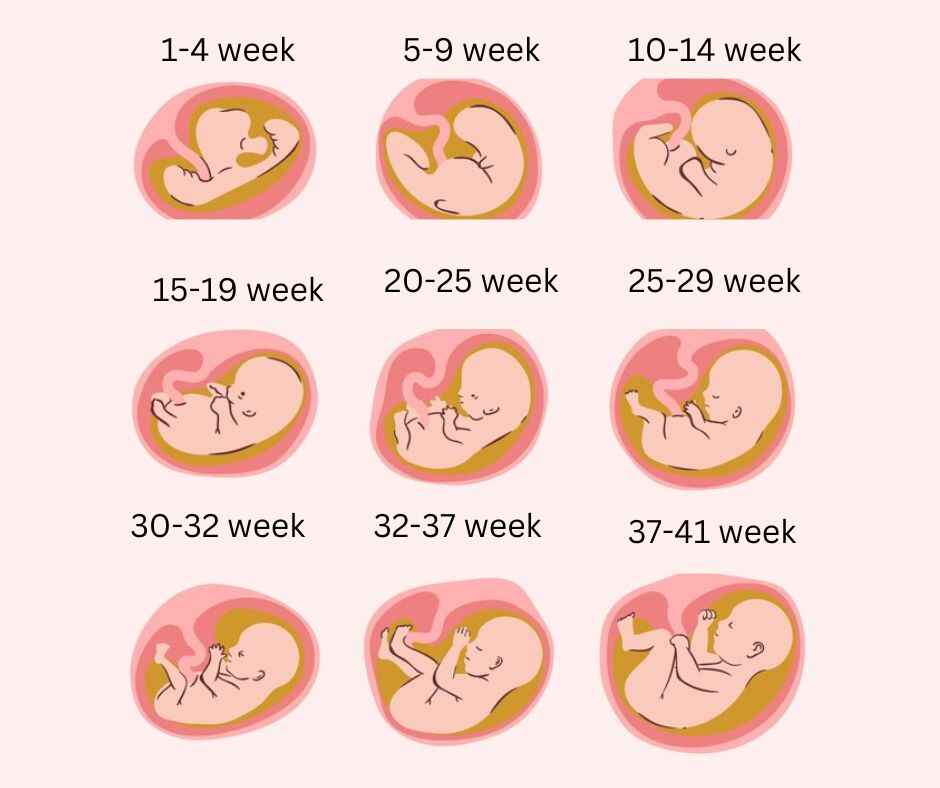Do you want to learn about your Pregnancy Week 10 Baby Activity, Mother’s Activity, and Symptoms? Read this article to delve into the details of the 10th week of pregnancy.
Table of Contents
Pregnancy at week 10. As in previous weeks, the growth and development of the baby are very rapid in the Pregnancy Week 10. The first 12 weeks of pregnancy are considered the first trimester, and during this period, the growth and development of the fetus are quite complex. At 10 weeks, the pregnancy is in the third month, or to be specific, two months and one week have passed. However, it should be remembered that doctors usually calculate pregnancy according to weeks.

Baby Development in Pregnancy Week 10
At the Pregnancy Week 10, the fetus is about the size of a palm with a length from top to bottom of about 1.22 inches or 3.1 centimeters and a weight of about 0.14 ounces or four grams. Around the tenth week, several changes occur in the normal development of the fetus in the womb.
By the 10th week, the fetal head covers about half of its entire body size, and the forehead is also slightly fixed and swollen. This fixed part plays a helpful role in the growth of the baby’s brain. At this time, the embryo’s ears begin to form on both sides of the head and the inner ear canals gradually expand. At this time, the eyelids of the fetus are almost formed, and they cover the eyes. Fetal eyelids remain closed until about 27 weeks of pregnancy.
The baby’s jawbone begins to form, and all of his baby teeth erupt at this time. The teeth begin to harden and attach to the jawbone during the week. The arms are bent at the child’s elbows and remain quite flexible, and it is possible to fold the arms. Knees and ankles begin to form, along with fingernails.
During this time, the fetus’s digestive system becomes active. Digestive juices that aid digestion start to be produced from the fetal pancreas. Additionally, insulin production begins from the fetal liver, pancreas, and intestines. Furthermore, the kidneys produce more urine compared to before, and in male fetuses, testosterone production starts, leading to the emergence of male reproductive characteristics. Also, at this time, the fingers and toes of the baby start to separate. The likelihood of any congenital defects decreases significantly after passing the tenth week.
At this point, the baby’s heart is fully formed and begins to function normally. The baby’s heart beats about 180 times per minute, which is almost two to three times more than that of an adult human.
During the fetus’s time in the womb, it may move with gentle nudges, and although the mother may not feel it, these movements can be seen on ultrasound exams. By this week, the mother’s uterus may somewhat resemble a large grapefruit, known as the pelvic cavity or pelvis. It occupies almost all of the available space within. At this time, the mother may feel pressure on her pelvis or abdomen with the hands placed over or slightly above the pelvis. By the tenth week, some mothers may notice a slight bulge in their lower abdomen. For some, there may not be much change in the size of the abdomen during the second trimester.
However, for others, changes in the size of the abdomen may begin during the first trimester. For first-time mothers, abdominal enlargement usually starts between 12 and 16 weeks. However, if a woman has had one or more pregnancies before, abdominal enlargement may start earlier than expected in subsequent pregnancies. This may be because their uterus and abdominal muscles are already stretched from previous pregnancies.
During this week, the veins in the mother’s body may become more visible. Especially around the breasts and feet, blood flow increases in the mother’s body during pregnancy so that circulation remains normal and the fetus receives proper nourishment. If the mother has fair skin and especially if the abdomen appears darker in color, these veins may become more visible.

Common symptoms of Pregnancy week 10: Physical changes
During this week, feelings of sadness, fatigue, and weakness, increased progesterone, loss of appetite, heartburn, and gas problems, and vaginal discharge may occur.
Many pregnant women occasionally feel like they’re losing their minds. Hormonal changes in the body during pregnancy can cause such feelings. If you feel like you’re losing your mind while standing, sit down somewhere quickly. If possible, try sitting with your head between your knees. It might not be possible to sit in the latter stages of pregnancy.
If that doesn’t work either, lie down on one side. This will help the blood flow to your body and brain stay normal, and unconscious feelings will gradually diminish. Round ligament pain is a kind of sharp pain that usually occurs for a short time and can feel somewhat like muscle cramps. This pain can occur on both sides. However, it is more common on the right side and can extend to the thigh.
Pregnant mothers often experience round ligament pain when they suddenly change positions. For example, pain can occur when getting up from bed or a chair, coughing, or moving around in bed. The presence of excess saliva in the mouth during pregnancy is quite normal. Due to hormonal changes, feelings of nausea and vomiting, etc. can lead to the production of excess saliva at this time. Besides these, pregnant women may experience various other symptoms during pregnancy.
Dos and Don’ts During 10 Week of Pregnancy
During pregnancy week 10, the growth of the fetus largely depends on the mother, so it is necessary for the mother to consume all types of nutritious foods for the complete development of the baby. The nutrition the baby receives depends on the food the mother eats. Therefore, the importance of a pregnant mother’s balanced diet is much greater compared to that of a normal woman. If the pregnant mother does not consume the right amount of food properly, the child will not develop properly, resulting in malnutrition. It is advised that a pregnant woman should drink at least eight glasses of water or fluids per day.
However, it is preferable to reduce the intake of tea, coffee, and cola in the evening and increase the intake of water in the morning. This is because drinking more water at night increases the tendency to urinate, which disrupts sleep.
During pregnancy, many women experience strange dreams. It could be one of the reasons for sleep disturbances. Relaxation techniques such as yoga, stretching, deep breathing, and massage can help you sleep better and keep you stress-free.
Read Also: Complete Guide to the Ninth Week of Pregnancy.
